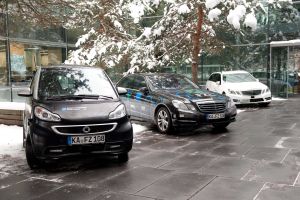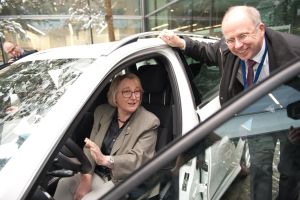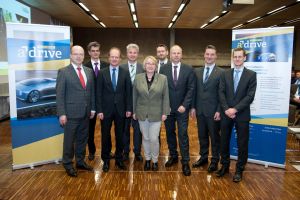Opening of the Tech Center a-drive in Ulm with Minister Bauer (from left to right): Stephan Wolfsried, Matthias Schulze (both Daimler AG), Professor Michael Weber (President of Ulm University), Professor Christoph Stiller (FZI/KIT), Dr. Thorsten Mahler (EICT), Professor Klaus Dietmayer (Ulm University), Professor Marius Zöllner (FZI/KIT), and Professor Christian Waldschmidt (Ulm University). (Photo: Eberhardt/ Ulm University)
Since Monday, Ulm University, Karlsruhe Institute of Technology (KIT), and the FZI Research Center for Information Technology have been pooling their competencies in the area of automated driving in the Tech Center a-drive. As a strong industry partner, Daimler AG is to enable quick implementation in practice. Today, the Tech Center a-drive was opened at Ulm University, the leading project partner, by Research Minister Theresia Bauer. Following the keynote speech (Matthias Schulze, Daimler AG) and welcome addresses by the partners, Minister Bauer was given the opportunity to inspect self-driving test vehicles.
“Research alliances, such as the Tech Center a-drive, are highly effective in linking industry and science, thus making the innovation process more active and lively. Let us all together – science, industry, and politics – start a new era of automobility with all our strength: Efficient, safe, ecologically compatible, comfortable, and smart,” the Minister said.
The Tech Center a-drive is funded with a total of EUR 7.5 million. Daimler AG contributes EUR 5 million, the Baden-Württemberg Ministry of Science, Research, and the Arts and the Baden-Württemberg Ministry of Finance and Economics provide EUR 1.25 million each.
“I wish the Tech Center a-drive a good start and a successful further development of technologies for Baden-Württemberg to remain ‘automobile state No. 1’. The basis required is established, the partners all assume a pioneer function in the area of autonomous driving. Ulm University will support and accompany research with great determination,” the President of Ulm University, Professor Michael Weber, said.
“Research and industry cooperate closely in the Tech Center a-drive in order to establish automated driving as a future-oriented technology. Baden-Württemberg as the automotive state in Germany is predestined for making decisive contributions in this important field of innovation,” the President of KIT, Professor Holger Hanselka, said. “Autonomous vehicles help people move safely from one location to the other and remain mobile in old age. For this reason, KIT research focuses on autonomous vehicle technology and, at the same time, on the interface between humans and technology as regards the acceptance of new mobility concepts by society and its legal, ethic, and social aspects.”
Scientists and automotive engineers already have advanced far on the way towards autonomous driving: Assistance systems facilitate parking or other standard maneuvers and under ideal conditions, test vehicles navigate in road traffic without any interference by the driver. A prominent example is the autonomous “Bertha Benz Drive” of Daimler AG from Mannheim to Pforzheim. It took place in 2013 with the support by the FZI Research Center for Information Technology and KIT. Such an autonomous drive requires a sophisticated interaction of sensors and cameras transmitting ambient data to computers in the vehicle. These “minicomputers” analyze the data, plan sensible actions, and then activate the steering system and accelerator pedal. However, changed weather conditions or unclear traffic situations might disturb this interaction. Improving the robustness of perception and action planning of automated vehicles is the research objective of the Tech Center a-drive.

Parallel to the event, test vehicles were presented by the partners. (Photo: Eberhardt/Ulm University)
Autonomous driving has a number of advantages, also in social respects: Transport safety and efficiency increase and the driving time can be used for other activities. Self-steering taxis might also enhance mobility of elderly and handicapped persons.
Strong Partners Pool Competencies
Ulm University has been conducting research into automated driving for more than ten years now. The Institute of Measurement, Control and Microtechnology (headed by Professor Klaus Dietmayer) focuses on the often complex innerurban traffic, in which stress of the driver is to be reduced. In line with the interdisciplinary research program of Ulm University of “Human-machine Interaction”, engineers, computer scientists, and psychologists cooperate closely, e.g. in the F3 Research Center funded by the Carl Zeiss Foundation. Since 2012, the Institute of Measurement, Control and Microtechnology and Daimler AG have been running the joint innovation center driveU. A junior professor for information fusion and tracking is being appointed at the moment. He will be financed by Daimler AG. Research results can be transferred to practice directly: Two driverless vehicles that coordinate their actions with each other drive on a test circuit on the campus.
Scientists of Ulm University under the direction of Klaus Dietmayer mainly contribute their know-how on sensor technology, sensor signal processing, multi-object tracking, and information fusion to the Tech Center a-drive. It is the objective to develop a comprehensive dynamic vehicle environment model and to assess the different driving situations. Professor Christian Waldschmidt (Institute of Microwave Engineering) will develop novel adaptive sensors for vehicle environment perception, which can focus on certain areas of the environment or objects. Under any environmental conditions, these sensors have to work precisely. “The new Tech Center a-drive allows for a far closer cooperation of the research institutions that have been working on this area for many years now. In this way, we will certainly succeed in enhancing the visibility of Baden-Württemberg in the area of “automated driving” on both the national and international level,” Professor Dietmayer, spokesman of the Tech Center a-drive, emphasizes.

Professor Klaus Dietmayer, spokesman of the Tech Center a-Drive, explains the test vehicle of Ulm University to Minister Theresia Bauer. (Photo: Eberhardt/ Ulm University)
KIT’s Institute of Measurement and Control has also been working successfully on the development of autonomous vehicles for many years now. Under the Tech Center a-drive, the Institute for Technology Assessment and Systems Analysis (ITAS) of KIT analyzes expectations and perceptions of citizens with respect to automated driving. Parallel to the further development of automated driving, responsibilities in transport are shifting considerably. Today, this complex network of technology, infrastructure, and human behavior is largely determined by man in his own responsibility. In case of automated driving, an increasing number of technical systems are integrated into the network as autonomous actors. These new types of cooperation between man and technology do not only have to be tested. They also have to be assessed legally, ethically, and socially. ITAS will conduct empirical studies focusing on the perspectives of citizens. What do they expect from this new technology? How do they perceive changes? The answers of these questions will be of decisive importance to acceptance of automated driving by society and of help to research and development.
Scientists of the FZI Research Center for Information Technology, Karlsruhe, study central technical challenges of automated driving: How can an automated car react to a spontaneous or difficult to foresee situation in a quick, reliable, and safe manner and swerve or replan the route accordingly? Within the framework of the Tech Center a-drive, FZI therefore works on the planning of the route, so-called trajectory planning. Work is aimed at automated driving without collision and in accordance with the rules as well as safely, efficiently, cooperatively, and naturally from the point of view of human traffic participants. FZI is also working on descriptions and concepts for consistent probability-based situation analysis, for the vehicles to make reliable and robust decisions also in case of difficult traffic situations. Difficult to evaluate objects and situations are to be modeled and predicted precisely in order to derive appropriate automated driving maneuvers. In addition to static traffic situations (such as driving lanes or rights of way that can already be managed well), spontaneously developing, dynamic traffic challenges shall be analyzed, planned, and predicted by the vehicle.
Professor J. Marius Zöllner, Executive Director of FZI: “For the human driver, it is easy to react to traffic situations that occur spontaneously: A pedestrian, who wants to cross the street, or a car of a parcel service that blocks the lane for a short time to deliver a parcel and forces other cars to overtake on the lane of oncoming traffic. For an automated vehicle, such driving maneuvers are a challenge. Our research at the Tech Center a-drive focuses on making such situations manageable by the self-driving vehicle without neglecting comfort, efficient traffic flow, and safety.” FZI is involved in three projects of the Tech Center a-drive. In addition, a number of publicly or directly funded projects of the non-profit research institution cover aspects of IT security, methods and tools for verification, and appropriate architectures of automated vehicles.
Contact partners of the research institutions:
Ulm University:
Annika Bingmann
Phone: +49(0)731-50 22121
E-mail:annika bingmann ∂does-not-exist.uni-ulm de
Karlsruhe Institute of Technology (KIT):
Monika Landgraf
Phone: +49(0)721-608 48126
E-mail:monika landgraf ∂does-not-exist.kit edu
FZI Forschungszentrum Informatik:
Johanna Häs
Phone: +49(0)721-9654 904
E-mail:haes ∂does-not-exist.fzi de
About Ulm University
Ulm University, the youngest university in Baden-Württemberg, was established in 1967 as Ulm College of Medicine and Natural Sciences. Since then, the scope of subjects has been extended significantly. The presently about 10,000 students study at four faculties (medicine, natural sciences, mathematics and economics, and engineering, computer science and psychology).
Ulm University is the driver and center of the Science City, in which a rather diverse research community of hospitals, technical companies and other institutions has developed. Research activities of the university focus on life sciences and medicine, biological, nanoscaled, and energy materials, financial services and their mathematical methods as well as on information, communication, and quantum technologies.
The FZI Research Center for Information Technology at the Karlsruhe Institute of Technology is a non-profit institution for applied research into information technology and technology transfer. Its task is to provide businesses and public institutions with the latest research findings in information technology. It also qualifies young scientists for their career in academics or business as well as self-employment. Led by professors from various departments, research teams at FZI interdisciplinarily develop and prototype concepts, software, hardware, and systems solutions for their clients.
More information on the mobility research sector can be found at www.fzi.de/en/research/research-sectors/anwendungsfelder-en/afeld/mobilitaet/.
In close partnership with society, KIT develops solutions for urgent challenges – from climate change, energy transition and sustainable use of natural resources to artificial intelligence, sovereignty and an aging population. As The University in the Helmholtz Association, KIT unites scientific excellence from insight to application-driven research under one roof – and is thus in a unique position to drive this transformation. As a University of Excellence, KIT offers its more than 10,000 employees and 22,800 students outstanding opportunities to shape a sustainable and resilient future. KIT – Science for Impact.

